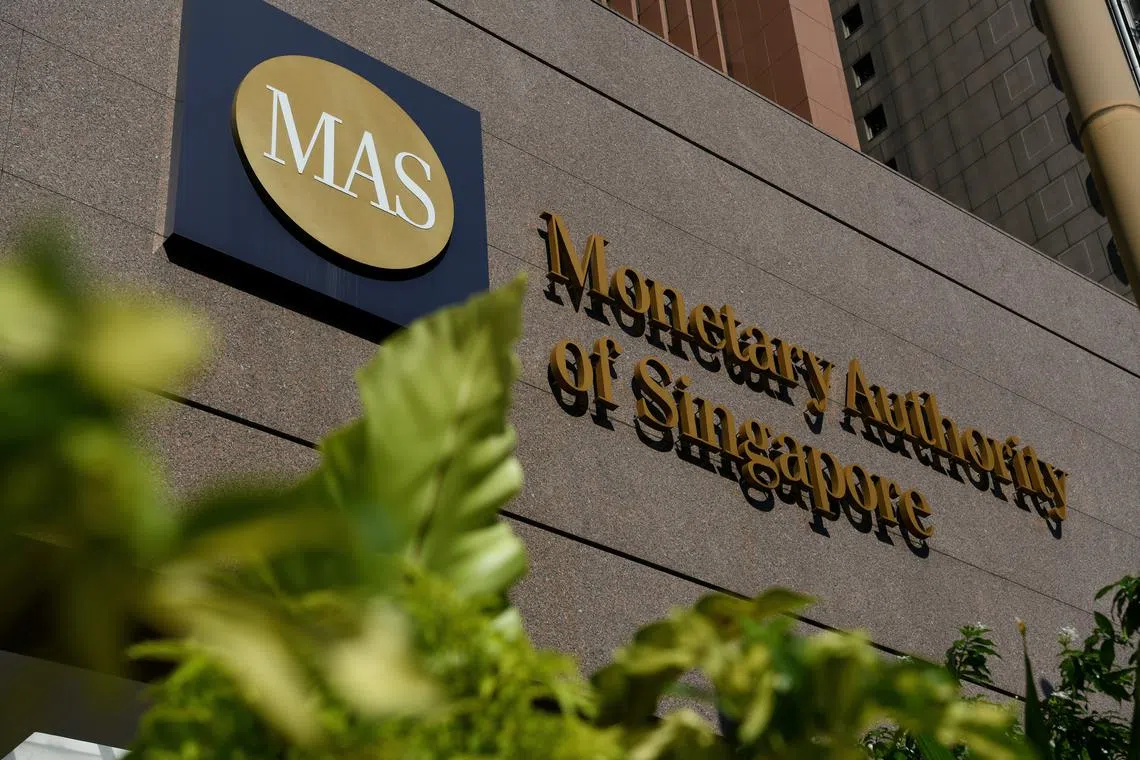MAS to keep support for strong Singapore dollar amid rising inflation risks: Analysts
Sign up now: Get ST's newsletters delivered to your inbox

Singapore's central bank is poised to stick to its three-year-old policy stance that supports a stronger currency, economists said.
PHOTO: ST FILE
SINGAPORE – Inflation in Singapore has cooled, but its central bank is poised to stick to its three-year-old policy stance that supports a stronger currency, given rising risks of higher prices from the Middle East conflict and the US presidential election, economists told The Straits Times.
If it stands pat at its upcoming policy review on Oct 14, the Monetary Authority of Singapore (MAS) will be bucking the global easing trend seen in the first interest rate cuts in four years by the US Federal Reserve,
Unlike other central banks, MAS uses the trade-weighted value of the Singapore dollar to achieve price stability. It guides the local dollar against a basket of currencies of its major trading partners to crimp the cost of imports.
It has to balance this against the risk of a too-strong Singdollar that would make exports more expensive to overseas markets and deter tourists from visiting Singapore.
Like other central banks, MAS has succeeded in bringing down core inflation which hit 5.5 per cent at its peak in January 2023. Still, core inflation picked up to 2.7 per cent in August, after falling to 2.5 per cent in July, its lowest since 2022.
The recent surge in global crude oil prices as the conflict in the Middle East escalates threatens to upend some of the gains in the fight against inflation.
Higher oil prices can drive up prices of products made out of it, such as petrol, diesel, jet fuel and fuel oils used in ships. With a lag, oil prices also influence the cost of coal and natural gas – the dominant fuels in power generation.
A sustained increase in transport and electricity costs can make virtually everything more expensive and bump up the cost of living and doing business.
Crude has risen by about 8 per cent or US$10 a barrel in the past few weeks amid speculation that Israel will target the petroleum infrastructure of Iran – the world’s fourth top oil exporter.
However, given the current situation of more supply than demand in the oil market, crude prices, as represented by the global benchmark Brent, can quickly fall back to their two-year low of US$69.19 recorded on Sept 10.
Still, given the highly unpredictable situation in the Middle East, policymakers may see higher oil prices as a risk worth consideration in setting monetary policy.
Ms Selena Ling, chief economist and head of global markets research and strategy at OCBC, said: “The latest developments in the Middle East have heightened market uncertainties... and translated to upward pressure on crude oil prices. If sustained, this could potentially reignite upside inflation risks and possibly constrain the global monetary policy cycle.”
She added: “For the upcoming MAS policy decision, the status quo is likely to be maintained given current two-sided inflation risks.”
The US presidential election offers a different kind of risk – though still very much related to inflation and monetary policy outlook.
Heightened global market volatility, in particular the sentiment on the US bond market that influences the strength of the US dollar, would also be worth considering as the Nov 5 US presidential polls draw closer.
November will also see a Fed rate-decision meeting.
If the result of the election or the Fed decision disappoints investors, they may express their displeasure by selling US assets. A sell-off in bonds would push yields higher and strengthen the US dollar, which will pressure other currencies and boost import costs.
Some analysts believe Singapore policymakers themselves would like to have a better understanding of the new US administration and its policies.
Republican presidential candidate Donald Trump has promised to use sweeping new import tariffs to fund everything from tax cuts to childcare. But most economists estimate higher tariffs would increase import costs and boost the country’s deficit. Higher US inflation and increased government borrowing would send bond yields up.
Mr Ang Kai Wei, Asean economist at Merrill Lynch (Singapore), said MAS on Oct 14 is likely to stick to a wait-and-see mode, especially ahead of the US election.
“MAS may need time for a more comprehensive assessment of the growth and inflation impact from future US policy directions,” he noted.
Robust growth in the US has been a key source of global economic resilience in 2024, in contrast to disappointing performances by China, the world’s second-largest economy, and Germany – the European Union’s biggest economy.
No matter who becomes US president, the American economy is projected to go into a cyclical slowdown in 2025.
But for 2024, Singapore’s economic growth may not need monetary policy support.
In fact, DBS Bank economist Chua Han Teng expects growth to pick up strongly to more than 4 per cent in the third quarter of 2024, driven partly by a rebound in manufacturing and exports.
“Growth could exceed the Government’s 2 per cent to 3 per cent forecast range,” said Mr Chua, referring to the estimate of the Ministry of Trade and Industry. The ministry will release the latest estimate of third-quarter gross domestic product growth on Oct 14.
Merrill Lynch’s Mr Ang said robust 2024 growth and easing inflation mean the MAS can wait all the way to its April meeting to make a move.
“Our base case remains for an extended pause, and we reiterate our earlier view that any live meeting is more likely in April,” he said.
By that time, there will also be greater clarity on the breadth of inflation from usual start-of-year price adjustments by businesses, impact of Singapore Budget 2025 and any revisions to inflation outlook after incorporating household expenditure patterns, Mr Ang added.



